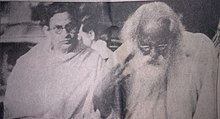쿠시티 모한 센
 | |
| 인물 정보 | |
|---|---|
| 탄생 | 1880년 12월 2일 영국령 인도 제국(현 방글라데시 다카 ) |
| 사망 | 1960년 3월 12일 (79세) |
| 학문 | |
| 연구분야 | 인도학 · 철학 · 문학 |
| 연구기관 | 비슈바 바라티 대학 |
쿠시티 모한 센 [1] ( 벵골어 : ক্ষিতিমোহন সেন , 영어 : Kshitimohan Sen , 1880년 12월 2일 - 1960년 3월 12일 )는 , 인도 벵골 지방을 연구하고 산스크리트어 교수, 비슈바 바라티 대학(현 타고르 국제대학 )의 부학장 [2] 등을 역임했다.
경력 [ 편집 ]
1880년 당시 영국령 인도 제국 (현 방글라데시 )이었던 다카 지구의 소나란 마을(Sonarang)에서 태어났다. 아버지는 의사였다고 한다.
라빈드라나트 타고르 가 설립한 비슈바 바라티 대학 의 부학장이 되어, 산스크리트어 교수도 겸임하여 교학에 임했다. 센은 다골이 사학을 설립했을 때 교장으로 초청된 인물이었고, 다골의 부하보다는 '동료'라고 해서 좋은 입장이었다. 간디와도 사이가 좋았던 것 같고, 함께 촬영한 사진이 남아 있다.
실적 · 연구 내용 [ 편집 ]
- 타골과 공동으로, 바울 의 방대한 가집을 수집, 출판함과 동시에 연구를 발표했다. 그것에 의하면 바울이 목표로 하는 것은 자유이며 「모든 외견적인 강제로부터의 자유」라고 했다. 그 때문에 바울은 인간을 차별하는 카스트 제도를 인정하지 않고 우상숭배나 사원숭배도 하지 않는다고 했다. 또한, 바울의 사상을 '인간 속에 하나님이 살고 있다'며 인간 속에 숨어 있는 고차원적 존재인 '모넬 마누쉬(마음의 사람)'를 주장했다 [3] .
- 어학에 능숙하고 산스크리트어 , 벵골어 , 힌디어 외에 구자라트어 , 라자스탄 어, 아랍어 , 페르시아어를 조종, 힌두교 관련, 인도의 중세 신비주의, 고대 인도의 문화와 인종 차별에 관해서도 책을 기재했다. 50년 이상에 이르는 연구 기간에 많은 저작을 남겼다. 특히 '힌두교'는 프랑스어, 독일어, 네덜란드어, 그리고 일본어 등으로 번역되었다.
가족·친족 [ 편집 ]
- 손: 아말티아 센 은 경제학자로 노벨 경제학상을 수상했다. 아말티아와 결혼한 캠브리지 대학 교수의 엠마 조지나 로스차일드 와는 의리의 손자의 관계에 해당한다.
저작 [ 편집 ]
일본어 번역된 출판물 [ 편집 ]
- 쿠시티모한센(나카가와 마사유역) 『힌두교』 코단샤 현대신서, 코단샤, 1999년. ISBN 978-4061494695
각주 [ 편집 ]
- ^ 키시티 모한 센, 쿠시티 모한 센, KM 센, KM 센 등이라는 일본어 표기도 볼 수 있다.
- ↑ Kshitimohan Sen - visva bharati university
- ^ 무라세 토모저 「풍광의 우타비와 바울의 문화 인류학적 연구」P131
Kshitimohan Sen
Kshitimohan Sen | |
|---|---|
 Kshitimohan Sen with Rabindranath Tagore | |
| Born | 30 November 1880 |
| Died | 12 March 1960 (aged 79) |
| Nationality | Indian |
| Occupation(s) | Professor, writer |
Kshitimohan Sen (2 December 1880 – 12 March 1960) was an Indian scholar, writer, a Sanskrit professor and an M.A. in Sanskrit from Queen's College, Benares. He was born in a family hailing from Sonarang in Bengal Presidency (now in Bangladesh). He started his working life at the Department of Education, Chamba State. In 1908, at the call of Rabindranath Tagore, he joined Brahmacharyashram. Later he performed responsibility of Adhyaksha of Vidyabhaban. He was the first Deshikottam (1952) of Vishwa Bharati. He was an acting Upacharyas of Visva-Bharati University (1953–1954).[1] He is the maternal grandfather of Amartya Sen.[2]
Books[edit]

- Kabir (1910–11)
- Bharatiya Madhyayuger Sadhanar Dhara (1930)
- Dadu (1935)
- Bharater Sangskrti (1943)
- Banglar Sadhana (1945)
- Yuga Guru Rammohan (1945)
- Jatibhed (1946)
- Banglar Baul (1947)
- Hindu Sangskrtir Svarup (1947)
- Bharater Hindu-Mussalman Yukta Sadhana (1949)
- Prachin Bharate Nari (1950)
- Chinmay Banga (1957)
- Hinduism (1961)
- Sadhak O Sadhana (2003)
References[edit]
- ^ "Kshitimohan Sen (1880-1960)". Visva-Bharati University. Archived from the original on 1 July 2011. Retrieved 18 October 2012.
- ^ "Honorary Degree Citation: Amartya Sen". University of the Witwatersrand. Archived from the original on 13 August 2012. Retrieved 18 October 2012.
